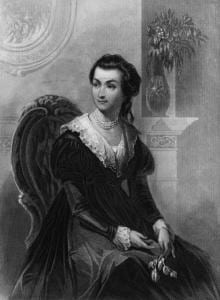Abigail Adams died on this day, the 28th of October, 1818.
In the Christian calendar remarkable people are often recalled on the anniversary of their death with a feast. I am slightly more inclined to recall people on their birthdays, that moment with so much that could happen waiting, pregnant in time. But there’s a lot to be said to mark out the end point, when all has been said and done.
And with Abigail, we have a lot said. And a lot done.
One of the signal events of our New England sojourn was being able to visit the First United Parish (Unitarian) in Quincy, and visit its catacomb and the graves of the presidents Adams, and their spouses. All are worthy to think about, but in many ways, it’s Abigail who remains my favorite.
Much is made of her influence on her husband’s thinking. And her political views are complex enough to have kept scholars in work for generations.
One thing was certain. Her views on slavery were quite clear.
As noted in her biographical sketch at the Dictionary of Unitarian & Universalist Biography, “A visit below the Mason-Dixon line strengthened Abigail’s conviction, passionately shared by her husband, that slavery was not only evil, but a threat to the American democratic experiment. Neither John nor Abigail had any use for Southern slavery accommodationists. On March 31, 1776, Abigail wrote that she doubted the distinguished Virginians in the corridors of power had quite the “passion for Liberty” they claimed, since they had been used to “depriving their fellow Creatures” of freedom.”
On the purely spiritual side of things, when her husband took off for the revolution the family were progressive Congregationalists. When he returned he found they were now Unitarians.
In Wikipedia she is quoted from a letter to her son two years before her death, “I acknowledge myself a unitarian – Believing that the Father alone, is the supreme God, and that Jesus Christ derived his Being, and all his powers and honors from the Father … There is not any reasoning which can convince me, contrary to my senses, that three is one, and one three.”
This reflect the intellectual rigor of early New England Unitarianism, which noted the textual lack of any clarity in support of claims for belief in a trinity. Personally I find this less important than the subsequent generation’s full on engagement with Transcendentalism, the power of intuition and the divine quality of nature. But, still there’s a lot to be said for intellectual rigor even in matters of religion.
I think, rather more important than the head of a needle questions of one and three, and much more to the point, in the year of her death, writing to her daughter-in-law Louisa Adams, “When will Mankind be convinced that true Religion is from the Heart, between Man and his creator, and not the imposition of Man or creeds and tests?”
Intimate. Intimate.
Oh, and that thing about what we do being the final proof of our pudding. The heart of ethical religions. And a reminder for all of us…













